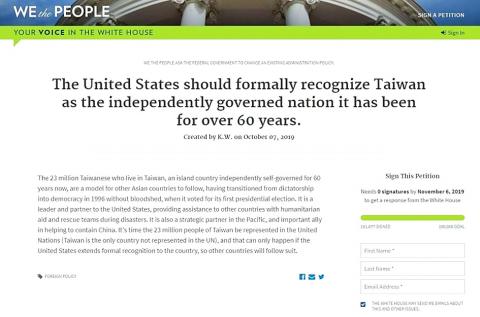An online petition launched by a US citizen calling on the US to formally recognize “Taiwan as [an] independently governed nation” yesterday passed the 100,000 signature threshold.
The petition, submitted to the White House Web site “We the People” on Monday last week by a person identified only as “K.W.,” argues that Taiwan could only join the UN if the US recognized its sovereignty and set an example for other nations.
The White House generally responds to petitions within 60 days of the threshold being reached, the Web site says.

Screen grab from the White House Web site
“However, depending on the topic and the overall volume of petitions from We the People, responses may be delayed,” it says.
The Ministry of Foreign Affairs yesterday acknowledged the petition and said it would continue to deepen its “friendly partnership” with the US.
The ministry respects the action by the petitioner, but reminds the public that launching White House petitions is a personal undertaking by US citizens, ministry spokeswoman Joanne Ou (歐江安) said.
The ministry would continue to monitor developments related to the petition and would continue to develop relations with the US through existing channels, she said.
This is not the first time a petition has been launched calling on a foreign government to recognize Taiwan.
Michael Kreuzberg on May 31 submitted a petition to the Bundestag asking the German government to establish diplomatic relations with Taiwan and on Sept. 11 posted the petition online to collect signatures.
The petition reached the 50,000 signature threshold by the deadline on Oct. 3 and the Bundestag is expected to put the issue on its agenda for debate.
In 2016, a petition calling on the British government to recognize Taiwan was launched on the UK government’s petition Web site.
While the petition reached the threshold to prompt a response from the British government, London at the time said the Taiwan issue requires dialogue across the Taiwan Strait to establish a consensus between people from the two sides.
Additional reporting by CNA

PREPAREDNESS: Given the difficulty of importing ammunition during wartime, the Ministry of National Defense said it would prioritize ‘coproduction’ partnerships A newly formed unit of the Marine Corps tasked with land-based security operations has recently replaced its aging, domestically produced rifles with more advanced, US-made M4A1 rifles, a source said yesterday. The unnamed source familiar with the matter said the First Security Battalion of the Marine Corps’ Air Defense and Base Guard Group has replaced its older T65K2 rifles, which have been in service since the late 1980s, with the newly received M4A1s. The source did not say exactly when the upgrade took place or how many M4A1s were issued to the battalion. The confirmation came after Chinese-language media reported

A Ministry of Foreign Affairs official yesterday said that a delegation that visited China for an APEC meeting did not receive any kind of treatment that downgraded Taiwan’s sovereignty. Department of International Organizations Director-General Jonathan Sun (孫儉元) said that he and a group of ministry officials visited Shenzhen, China, to attend the APEC Informal Senior Officials’ Meeting last month. The trip went “smoothly and safely” for all Taiwanese delegates, as the Chinese side arranged the trip in accordance with long-standing practices, Sun said at the ministry’s weekly briefing. The Taiwanese group did not encounter any political suppression, he said. Sun made the remarks when

The Taiwanese passport ranked 33rd in a global listing of passports by convenience this month, rising three places from last month’s ranking, but matching its position in January last year. The Henley Passport Index, an international ranking of passports by the number of designations its holder can travel to without a visa, showed that the Taiwan passport enables holders to travel to 139 countries and territories without a visa. Singapore’s passport was ranked the most powerful with visa-free access to 192 destinations out of 227, according to the index published on Tuesday by UK-based migration investment consultancy firm Henley and Partners. Japan’s and

BROAD AGREEMENT: The two are nearing a trade deal to reduce Taiwan’s tariff to 15% and a commitment for TSMC to build five more fabs, a ‘New York Times’ report said Taiwan and the US have reached a broad consensus on a trade deal, the Executive Yuan’s Office of Trade Negotiations said yesterday, after a report said that Washington is set to reduce Taiwan’s tariff rate to 15 percent. The New York Times on Monday reported that the two nations are nearing a trade deal to reduce Taiwan’s tariff rate to 15 percent and commit Taiwan Semiconductor Manufacturing Co (TSMC, 台積電) to building at least five more facilities in the US. “The agreement, which has been under negotiation for months, is being legally scrubbed and could be announced this month,” the paper said,